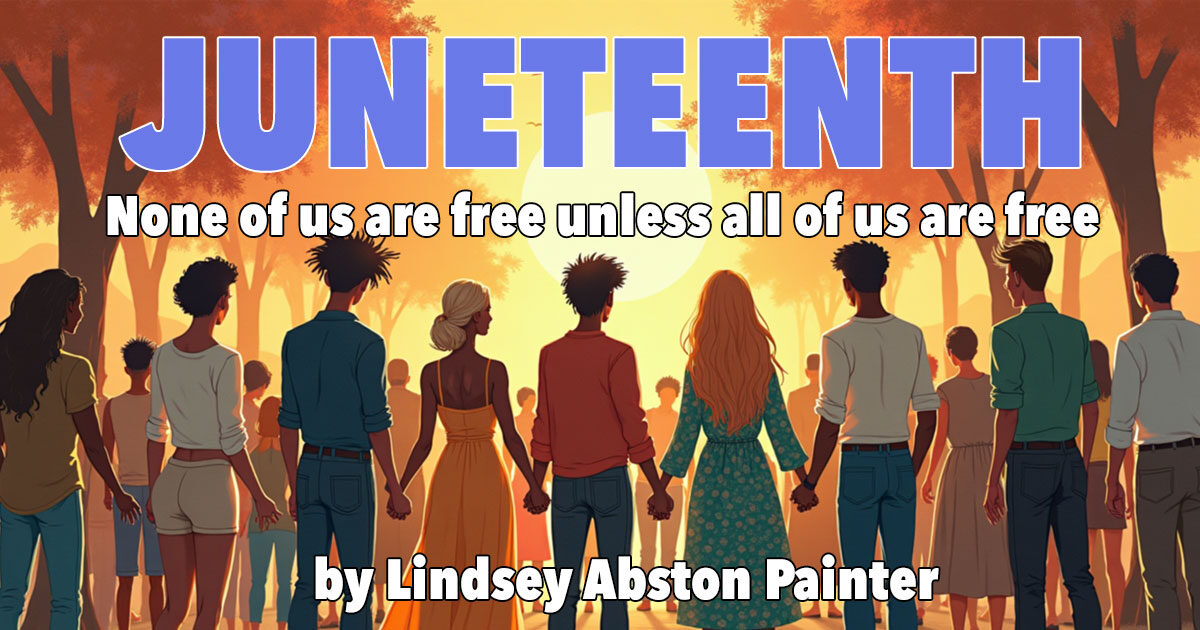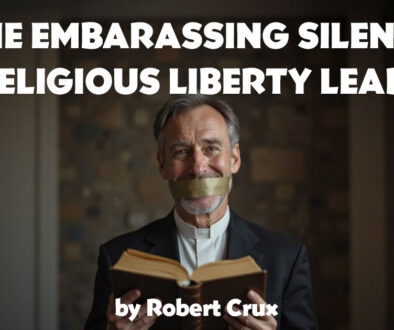Juneteenth
by Lindsey Abston Painter | 19 June 2025 |
A white woman may seem an unlikely author for an article about Juneteenth. While there are others who have more authority to speak on such things, I find myself captivated by Juneteenth.
Juneteenth is about the history of slaves being freed by Abraham Lincoln’s declaration—but many slaves around the country weren’t yet aware of their freedom. Even though the Emancipation Proclamation was signed into law, many slaves didn’t know about it. Juneteenth—June 19—celebrates the day the declaration of freedom was read out to the last to know about it, in Texas.
Imagine the scene. A man stands in a marketplace or town square. Maybe he’s standing on a crate or at a table. Perhaps he has sent word around town and a crowd of people, both slave and free, gather round. I imagine him holding up his paper while a hush falls on the crowd. He reads the proclamation aloud. And at the end, perhaps he dramatically says, “None of us are free unless all of us are free!”
And in that moment, those who should always have been free—and had actually been legally free for over three years—were finally made aware of their freedom. I find that scene in my imagination very moving.
None of us are free unless all of us are free.
We find the same sentiment in Galatians 5:13-14, which says,
“For you were called to freedom, brothers. Only do not use your freedom as an opportunity for the flesh, but through love serve one another. For the whole law is fulfilled in one word: ‘You shall love your neighbor as yourself.’”
With freedom comes responsibility. And our responsibility is to care for our neighbors.
And this message is as important now as it was then. Because we are not all free. It is common knowledge now that ICE agents are taking people into detention centers whether or not they have the correct paperwork. These government authorities seem to have a “detain now, ask questions never” policy. We know of several cases of people being detained unlawfully.
Is being undocumented a crime?
But let’s say that ICE were only taking undocumented people. Coming into this country illegally or overstaying a visa is a civil violation. It holds the same legal weight as a traffic ticket, a building code violation, or breaching the terms of a contract. Next time you’re caught for speeding, remember that you’ve committed a crime of the same legal weight as one of the people ICE is arresting and detaining in their horrifying detention centers.
For some people of my skin tone, it’s easy to feel separated from all these horrible things. After all, the news is telling us that the people being arrested by ICE are dangerous criminals. And people like me, with my white skin and my middle-class job and my Social Security number are safe—for now. (That’s another subject for another time.)
That’s why it’s so important for us to remember the lesson of Juneteenth. None of us are free unless all of us are free. Freedom has to be for everyone or it isn’t for anyone.
Due process
“Due process” is a legal guarantee that means a person can plead their case in court. Any person within the borders of the United States of America, for any reason, regardless of legal status, has a right to due process. If a person is grabbed off the street and denied their right to due process, then they have been denied the right to defend themselves in court. How do we know if someone should or should not be deported? We know through due process!
Without due process the government has the right to decide who is a “dangerous criminal” deserving of detention or deportation. What if some authority decides that trans people no longer have the right to due process? What if they decide that those who oppose the party in power no longer have the right to due process?
What if they decide that people who wear green sweatshirts don’t have the right to due process?
The example is absurd, of course: would the government decide that people wearing green sweatshirts don’t have the right to due process? But the absurdity makes the point that due process keeps our government from having power to arrest someone without cause. Without due process, they could take any of us.
None of us are free unless all of us are free.
Juneteenth was not made for me. It is not a holiday to be whitewashed, or watered down to be more palatable to people like me. It is a holiday to celebrate our Black brothers and sisters, and to remember the value of freedom, and reckon with the dark history of our country.
Since it has been made a national holiday, I hope that it will give us, the white people, a chance to reflect on how important it is for us to fight for freedom for everyone. If my skin and my Social Security card and my middle-class job make me (at least for the moment) safe from ICE, then I must be responsible for using that safety to do anything I can to demonstrate my opposition to the loss of freedom for my brothers and sisters. Undocumented or not, these are my brothers and sisters in Christ, and they are entitled to due process, and the legal protections afforded them by habeas corpus.
And if they are not free, none of us are free. Stand up. Use your voice. Wield your privilege like a weapon against those who would oppress others. And Happy Juneteenth.
 Lindsey Abston Painter is a teacher, and a member of the editorial team of Adventist Today.
Lindsey Abston Painter is a teacher, and a member of the editorial team of Adventist Today.




